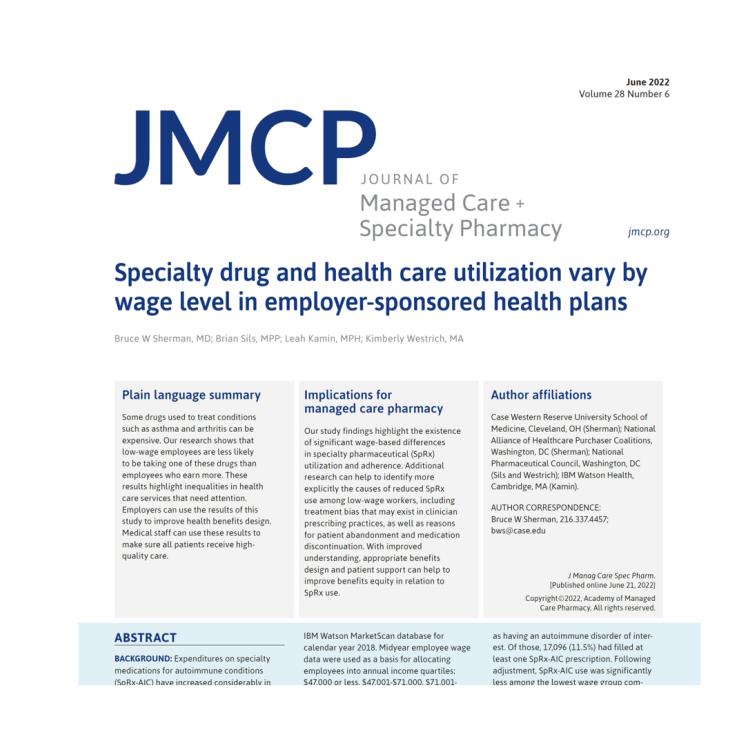Authors
Sherman BW, Sils B, Kamin L, Westrich K.
Publication
Journal of Managed Care & Specialty Pharmacy, online ahead of print, June 2022.
Background
Spending on specialty medications for autoimmune conditions has increased in recent years, raising affordability concerns for employers. This has led to greater patient cost-sharing through plan benefit design, the use of consumer-directed health plans, higher deductible thresholds, and copay accumulator adjustment programs. Prior studies have shown differential patterns of health care utilization in association with wage, driven in part by affordability issues. Out-of-pocket costs associated with these types of specialty medications have been shown to impact medication adherence, particularly for those with low incomes.
This study more closely examined the association of wage status on the use of specialty medication for autoimmune conditions and cost patterns among employees with employer-sponsored health insurance.
Methodology
Using the IBM Watson MarketScan database for CY 2018, researchers identified 2,071,980 active employees with employer-sponsored health insurance. The study population was limited to those taking a specialty medication for at least one applicable autoimmune condition: rheumatoid arthritis, atopic dermatitis, multiple sclerosis, psoriasis (plaque psoriasis and psoriatic arthritis), Crohn’s disease and asthma.
Midyear employee wage data, also gleaned from the IBM Watson MarketScan database, were used as a basis for allocating employees into annual income quartiles: $47,000 or less; $47,001- $71,000; $71,001-$106,000; and $106,001 and or more. The lowest quartile was further divided into two groups ($35,000 or less, $35,001-$47,000) to better evaluate subgroup differences at lower wage levels.
Results
An employee’s socioeconomic status has a clear impact on their health care usage.
Despite the higher prevalence of autoimmune conditions among employees in the lowest wage group, they were nearly 14% less likely to be using a specialty medication. In fact, employees in the lowest wage group had significantly lower days’ supply of specialty medications and proportion of days covered. There were no significant differences in medication discontinuation among different wage groups.
Employees in the lowest wage group had significantly more all-cause inpatient admissions and emergency room visits; there were no significant differences in outpatient services.
These findings raise concerns about employer benefit design inequities for access to specialty medications for autoimmune conditions and the resulting potential adverse impact on employee outcomes. The study adds to concerns about income and race inequalities in access to and use of prescription medicines.
This research provides the opportunity to better understand the impact of benefit design on equitable use of health care access for low-wage workers and suggests ways employers can more effectively design benefits that support access to medications for all patients, regardless of their socioeconomic status.
